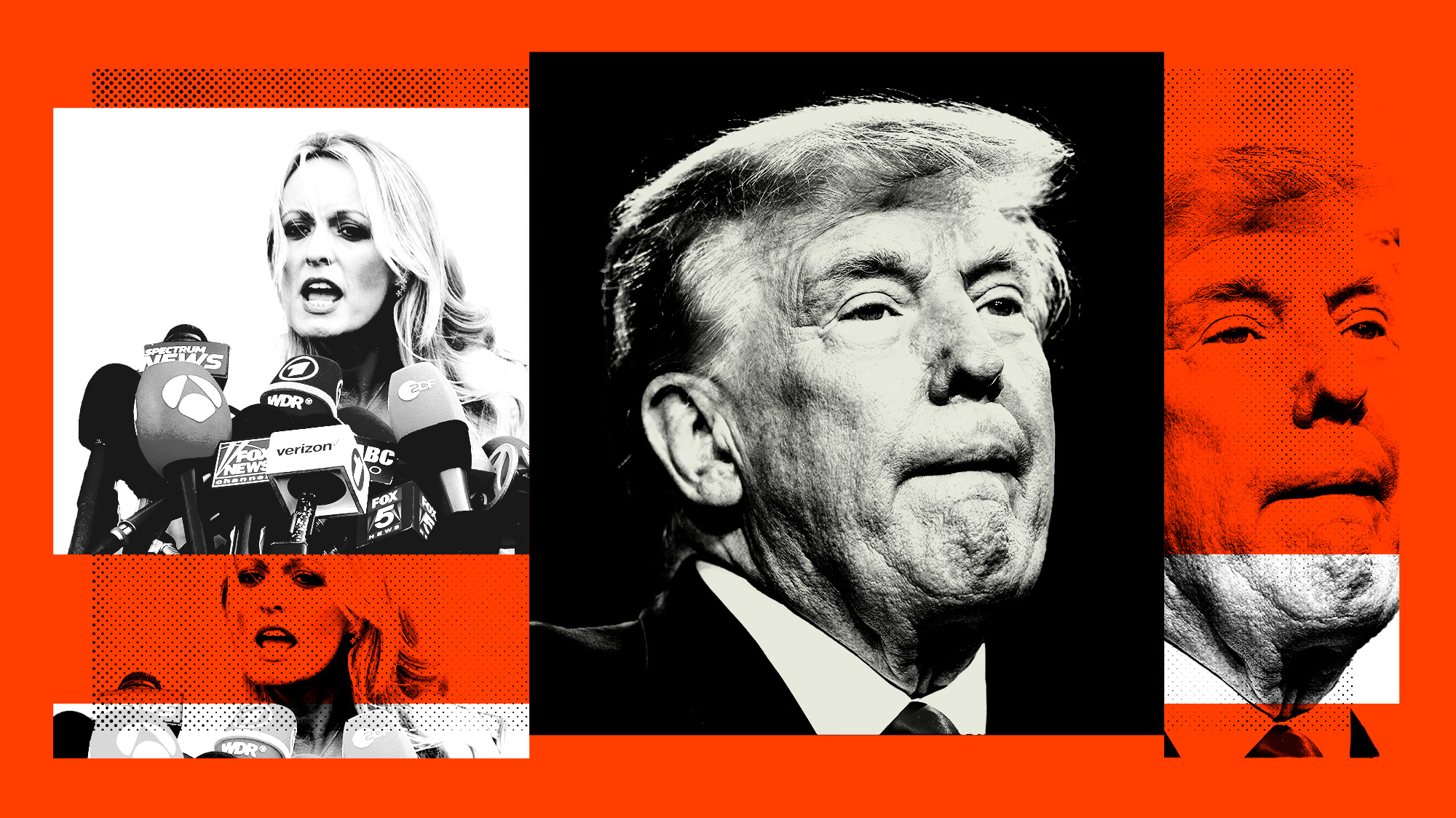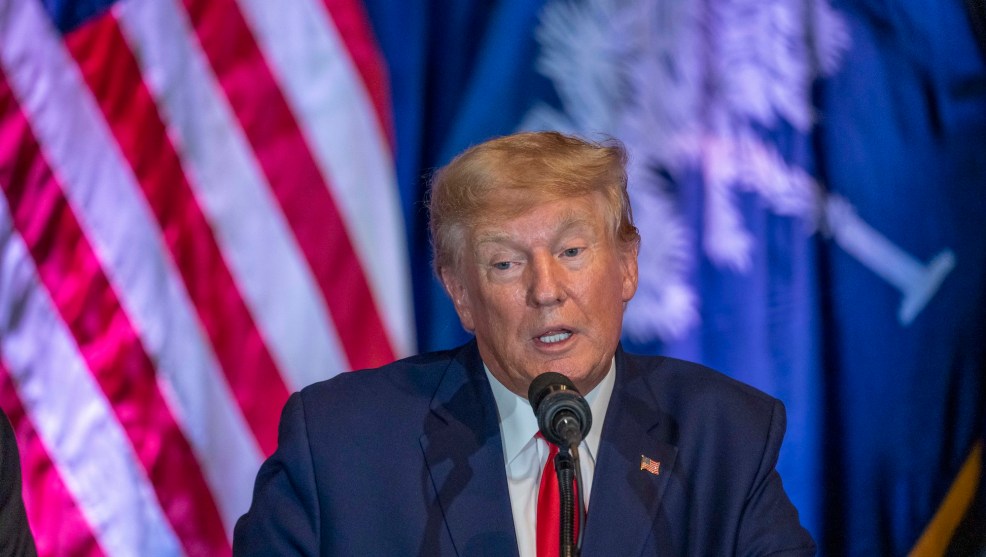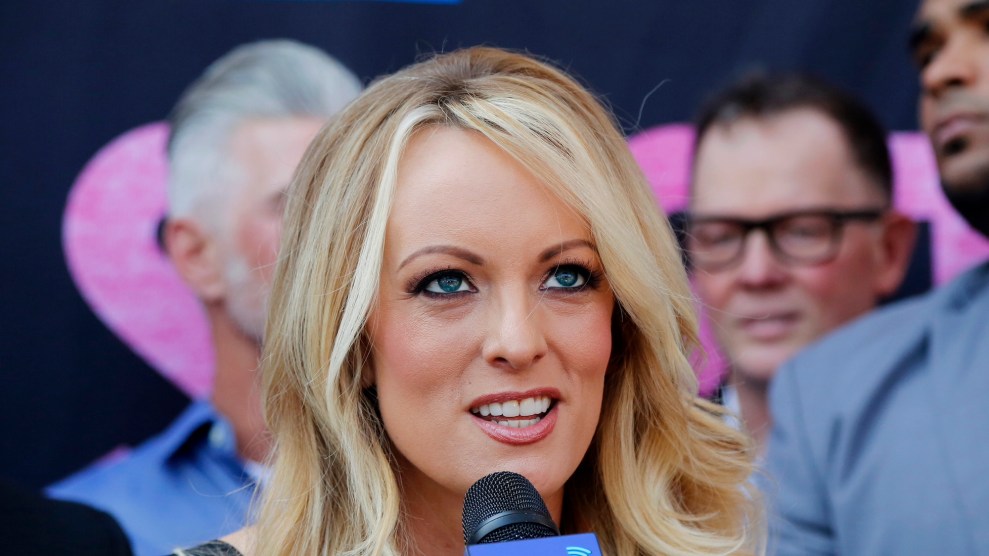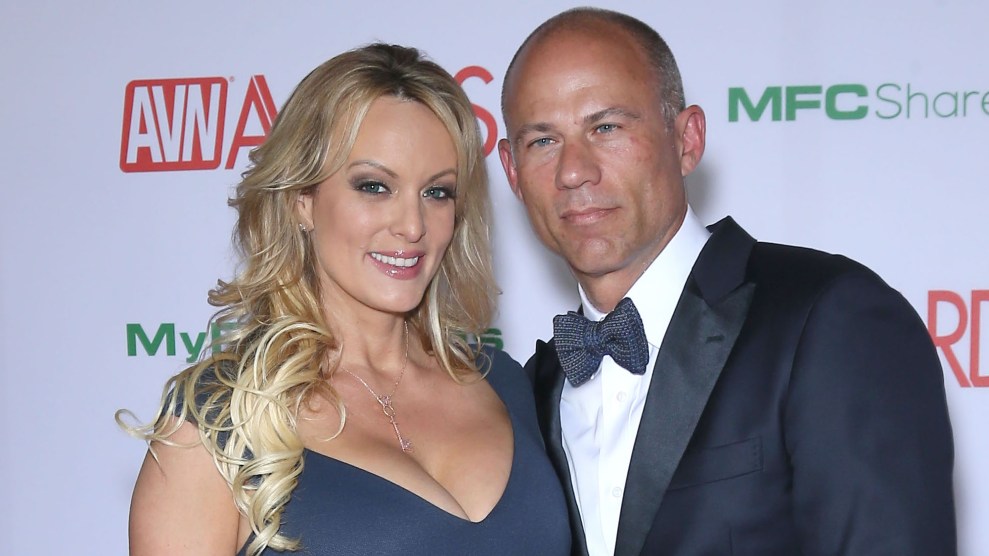With a possible indictment of Donald Trump, it’s a good moment to review how the porn-star-hush-money caper may make him the first president or ex-president ever charged with a crime. Such a refresher reminds us just how tawdry the Trump world has been, and it provides a cast of characters beyond Michael Cohen, the Trump fixer turned Trump foe, who might be star witnesses should this case reach a courtroom.
In a trial, the sleazy tale will be relentlessly scrutinized, and each side will try to shape the narrative to answer several critical questions in its favor: For what reason did Cohen pay Stormy Daniels $130,000 days before the 2016 election to stop her from airing the allegation that she and Trump had an extramarital (for him) tryst? Was it to protect Trump’s presidential bid or to spare Trump and his family personal embarrassment? (It certainly could be both.) Did Trump personally direct this payment of keep-mum money?
New York District Attorney Alvin Bragg can charge Trump with a felony only if Trump’s alleged falsifying of business records related to the hush-money payment was conducted to cover up fraud or another criminal act. That means the case hinges on the issue of whether this payment was made to influence the campaign and qualifies as a possible campaign law violation. Trump’s legal team will likely contend the payment did not violate campaign finance laws, even though in 2018 Cohen pleaded guilty to a federal campaign law violation for buying Daniels’ silence with these funds.
So what’s already known? Several sources chronicle the sequence of events that led to Trump’s consiglieri wiring $130,000 to an adult film director and actress, most notably a search warrant filed in Cohen’s case and Cohen’s own account in his 2020 book, Disloyal: A Memoir: The True Story of the Former Personal Attorney to President Donald J. Trump. According to both, this episode was triggered by the worst moment in the 2016 campaign for the Republican presidential nominee: When the Washington Post on October 7 revealed the existence of the Access Hollywood outtake in which Trump boasted that his celebrity afforded him the license with women to “grab ’em by the pussy.” For weeks prior to this explosive disclosure, Daniels had considered going public with the story of her alleged sexual affair with Trump, which supposedly began at a celebrity golf tournament in 2006. She had been talking to various media outlets about selling her tale; this bombshell upped the value of her story and intensified her interest in profiting off her alleged romp with Trump.
Trump and Cohen had dealt with Daniels before. In 2011, a website called thedirty.com published an uncorroborated article claiming Daniels and Trump had a sexual encounter at a “golfing event.” After the piece was posted, a lawyer for Daniels named Keith Davidson contacted Cohen. Davidson, Cohen recounts in his book, wanted to stop the spread of this story—which had also reached a supermarket tabloid called Life & Style—and he asked if Trump would issue a statement denying the allegation to match a similar statement from Daniels. Cohen was surprised, assuming at first that this call would be part of a shakedown scheme. After consulting with Trump, Cohen drafted a statement from Trump denying the affair, though Cohen suspected the tryst had transpired. Cohen also called an agent who was peddling the Daniels allegation and threatened her, demanding that she stop. As a potential problem for Trump, the Stormy Daniels story faded away.
Until the Access Hollywood video appeared. The next evening, over the course of about 90 minutes, Cohen, according to the search warrant, had a flurry of calls with Trump, campaign aide Hope Hicks; David Pecker, a Trump confidante and president of American Media, Inc. (AMI), which published the National Enquirer; and Dylan Howard, its editor-in-chief. The search warrant doesn’t note what was said in these conversations.
Months earlier, Cohen, Trump, Pecker, and Howard had banded together to silence a former Playboy model named Karen McDougal who said she had a sexual relationship with Trump in 2006 and 2007. AMI paid her $150,000 in what tabloid business pros call a “catch and kill” operation—buying a story to smother it. Pecker was doing the Republican candidate a favor, and Trump was supposed to pay the money back. He didn’t.
As Cohen recounts, the day after the Access Hollywood video emerged, Pecker informed him, “Stormy is back,” and she was “shopping” her story. Cohen thought the Daniels episode was done. After all, she had denied the allegation five years earlier. Pecker told Cohen she had passed a lie-detector test confirming the sexual encounter with Trump and that he had dispatched Howard to Los Angeles to review the polygraph results and initiate negotiations with Daniels’ team, apparently with the aim of smothering yet another incendiary revelation about Trump. At one point that night, after Cohen spoke to Pecker, he spoke to Trump for nearly eight minutes, according to the FBI search warrant. After that, Cohen spoke twice to Howard, and then Howard sent Cohen a text message: “Keith will do it.” That was a reference to Davidson, Daniels’ attorney, indicating he was amenable to crafting a deal.
A few hours later, at 3:31 a.m., Cohen texted Howard, “Thank you.” It was followed by another Cohen text that marked the beginning of the agreement that would shut Daniels up: “Resolution Consultants LLC is the name of the entity I formed a week ago.” This was a corporate entity that could be used for a hush-money arrangement.
The texts continued that morning. Howard wrote Cohen and Davidson: “[C]onnecting you both in regards to that business opportunity. Spoke to the client this AM and they’re confirmed to proceed with the opportunity…Over to you two.” The client presumably meant Stormy Daniels. Shortly after that, Davidson texted Cohen, “Michael—if we are ever going to close this deal—[i]n my opinion, it needs to be today.” According to Cohen, in one of his subsequent phone conversations with Davidson, the attorney said, “What I think you should do is buy the story. We can write up an NDA together and stop the story again.” After a bit of back and forth, the two lawyers negotiated a price, settling on $130,000, which would allow Daniels to clear $100,000 after paying Davidson and her rep.
Cohen, in his telling, had to inform Trump and get him to approve the hush-money accord. In Trump’s office in Trump Tower, the two men got Pecker on the line. “How bad do you think this could hurt me with the campaign?” Trump inquired, according to Cohen. “It can’t be good,” Pecker said. Referring to his wife Melania, Trump joked, “Let’s not forget about upstairs.” Trump told the pair that he wanted to think about the possible payoff overnight. The next morning, he gave his okay, according to Cohen, and told him to work out the specifics with Allen Weisselberg, the chief financial officer of the Trump Organization, on how to get Daniels the money. In a conversation with Cohen and Weisselberg about the pending deal, Cohen writes, Trump speculated on how Daniels’ allegation might influence his supporters.
At first, the deal was moving quickly. By October 10, the basic outline of the covert arrangement was forged. According to the search warrant, Daniels and Davidson signed a side-letter agreement that stated it was an exhibit to a “confidential settlement agreement and mutual release” between two people named “Peggy Peterson” and “David Dennison”—pseudonyms used to describe Daniels and Trump in the main agreement. The side letter identified “Peterson” as Daniels but made no direct mention of Trump.
Cohen recalls that figuring out how to transfer the money to Daniels was a challenge. AMI wouldn’t foot the bill after having been stiffed by Trump in the McDougal episode. Weisselberg suggested a variety of creative schemes: invoicing one of the Trump golf clubs, or trading a Mar-a-Lago membership to a third party who would compensate Daniels. He wondered if someone having an affair at a Trump property could be encouraged to pick up the tab in exchange for discretion. None of these options was practical. Cohen asked Weisselberg to do it. But the CFO refused. Eventually, Cohen decided he had to do it himself by using his existing home equity line of credit to pay the porn actress. Trump, he says, assured him he would be reimbursed “right after the election when things calm down.”
The search warrant notes that starting on October 13, Cohen took steps to make the payment that included opening an account from which he could transfer funds to Davidson. But as the talks between the Trump camp and Team Stormy dragged out, Daniels and Davidson grew increasingly impatient. On October 17, Davidson emailed Cohen and threatened to cancel the deal if the transaction was not completed that day. Howard texted Cohen, “I’m told they going with DailyMail,” referring to the British tabloid. Cohen called Howard, then Davidson, and unsuccessfully tried to reach Trump. More calls and texts ensued between Cohen and Howard. The next day, The Smoking Gun website ran a story headlined “Donald Trump and the Porn Superstar” that alleged that Trump and Daniels had an affair, but it noted Daniels had declined to comment.
For about two weeks, Cohen, according to his own account, slow-walked the deal, as he worked out the details for making the payment. During that time, Daniels became nervous, believing Trump was stalling until after the election when he might then refuse to pay. On the evening of October 25—two weeks before Election Day—Howard sent Cohen a text: “Keith calling you urgently. We have to coordinate something on the matter he’s calling you about or its [sic] could look awfully bad for everyone.” Cohen and Davidson spoke at least twice soon after. The next morning, Cohen had two phone conversations with Trump. Afterward, Cohen instructed his bank, First Republic, to open an account in the name of Essential Consultants, explaining this was a real estate consulting firm. (He had dumped Resolution Consultants as the vehicle for the Stormy Daniels payoff.) He then transferred $130,000 from his home equity line of credit into the account.
Throughout that day and into the night, there was a rush of calls and text messages between Cohen, Pecker, Howard, and Davidson. At 8:23 p.m., Howard sent an email to Cohen and Davidson with the subject line “Confirmation.” It stated, “Thank you both for chatting with me earlier. Confirming agreement on: Executed agreement, hand-signed by Keith’s client and returned via overnight or sameday FedEX to Michael… Transfer of funds Thursday AM to be held in escrow until receipt of agreement.”
On the morning of October 27, Cohen wired $130,000 to Davidson. Daniels’ lawyer emailed Cohen that “no funds shall be disbursed unless & until the plaintiff personally signs all necessary settlement paperwork.” In his book, Cohen observes that he and Pecker “were engaged in a parallel campaign, with the outcome of the 2016 election being decided in secret.”
The next day, a Friday, Cohen spoke to Trump for about five minutes around noon. In the evening, Davidson texted Cohen, assuring him “all is AOK” and promised to have the “notarized docs” on Monday, adding, “You should have them on Tuesday.” A few hours later, Cohen spoke to Hicks on the phone, according to the search warrant.
On November 1, a week before the election, the transaction was completed. “Peggy Peterson” (that is, Stormy Daniels) and Essential Consultants and/or “David Dennison” (that is, Donald Trump) had reached a settlement in which “Peterson” agreed not to disclose certain “confidential information pertaining” to “Dennison” in exchange for $130,000. A Federal Express package containing the signed agreement arrived at Cohen’s office. Davidson forwarded $96,645 to Daniels. The hush-money deal was done.
Later that day, Davidson sent Cohen an email with an audio file. It was a five-minute recording of Davidson interviewing Daniels about recent allegations made by porn actress Jessica Drake that Trump had sexually accosted her a decade ago. On the recording, Daniels said she did not believe Drake’s accusation was credible.
That evening, with the Daniels matter settled, Cohen placed a call to Trump but did not connect with him. He then tried Kellyanne Conway, Trump’s campaign manager, and did not reach her, either. But she soon called him back, and they spoke for six minutes, according to the search warrant. In his book, Cohen says he wanted to inform Trump that the Daniels transaction had been successfully concluded. Conway told him, he recalls, that she would pass along the good news. “Paying off the porn star was an open secret in the Trump campaign,” Cohen writes.
There was a sordid coda to this sordid business. On November 4, the Wall Street Journal revealed that AMI had paid Karen McDougal, the Playboy model, to bury her story. As that news hit, Cohen, Pecker, Howard, Davidson, and Hicks were calling and texting one another. In a text to Howard, Cohen wrote, “He’s pissed.” This was an obvious reference to Trump. At one point that night, Cohen texted Pecker that Trump was trying to reach him. The next morning, Cohen texted Hicks, “So far I see only 6 stories. Getting little to no traction.” Hicks replied, “Same. Keep praying!!”
Three days later, Trump was elected president.
The payment to Stormy Daniels did not become public until long after the election, when the Wall Street Journal reported the hush-money deal on January 12, 2018. In the weeks ahead, Cohen claimed that he had arranged the payment on his own, that Trump and the Trump Organization had not been a party to the transaction, and that neither had reimbursed him. Trump claimed ignorance, declaring that he knew nothing about the payment. But then—after FBI agents raided Cohen’s home and office and seized documents including paperwork connected to the Daniels payment—Rudy Giuliani, Trump’s personal attorney, acknowledged that Trump indeed had reimbursed Cohen. But he insisted that Cohen had paid off Daniels “on his own authority” and that Trump had been unaware of the payment at the time it was made. On Fox News, Giuliani told host Sean Hannity that Trump “didn’t know about the specifics of [the Stormy Daniels deal]…But he did know about the general arrangement. That Michael would take care of things like this.”
The publicly known details of the hush-money episode show there are multiple witnesses beyond Cohen who could address the key issues of whether Trump was aware of the deal and approved it in real-time, and whether a significant motive for arranging the payment was to keep a porn star quiet for campaign purposes. Cohen has been clear: Trump was in on it, and this was done to protect Trump from political fallout in the final weeks of the campaign. But all that will be challenged by Trump’s lawyers, if he is indicted. Unsurprisingly, Cohen, who pleaded guilty to campaign finance violations, tax evasion, making false statements to a bank, and lying to Congress, has been relentlessly attacked by Trump’s legal team as a witness with no credibility. That will obviously continue should Trump be brought to trial.
But the case does not rest entirely on Cohen’s word. Howard, Pecker, Davidson, Hicks, Conway, and Weisselberg—who these days resides in a prison cell on Rikers Island after pleading guilty to tax fraud charges—can each provide crucial information about what occurred. Weisselberg was a cooperating witness in Bragg’s successful prosecution of the Trump Organization for tax fraud, and Conway, Hicks, Pecker, Howard, and Davidson each have met with Bragg’s prosecutors. Pecker and Howard also previously cooperated with investigators. In 2018, federal prosecutors announced a non-prosecution agreement with Pecker’s AMI, in which the US attorney for the Southern District of New York agreed not to charge AMI with any crimes related to the payment to Playboy model Karen McDougal in return for AMI’s cooperation in the investigation and its admission the payment was done in concert with Trump’s campaign to suppress damaging allegations about Trump.
The publicly revealed texts, emails, and phone records in the hush-money escapade do not provide all the evidence needed to definitively answer the major questions regarding Trump’s role in the scheme and related matters. But they make clear that there are participants beyond Cohen who know what happened and that this historic prosecution, should it occur, might not depend solely on a fixer who turned against the boss.












